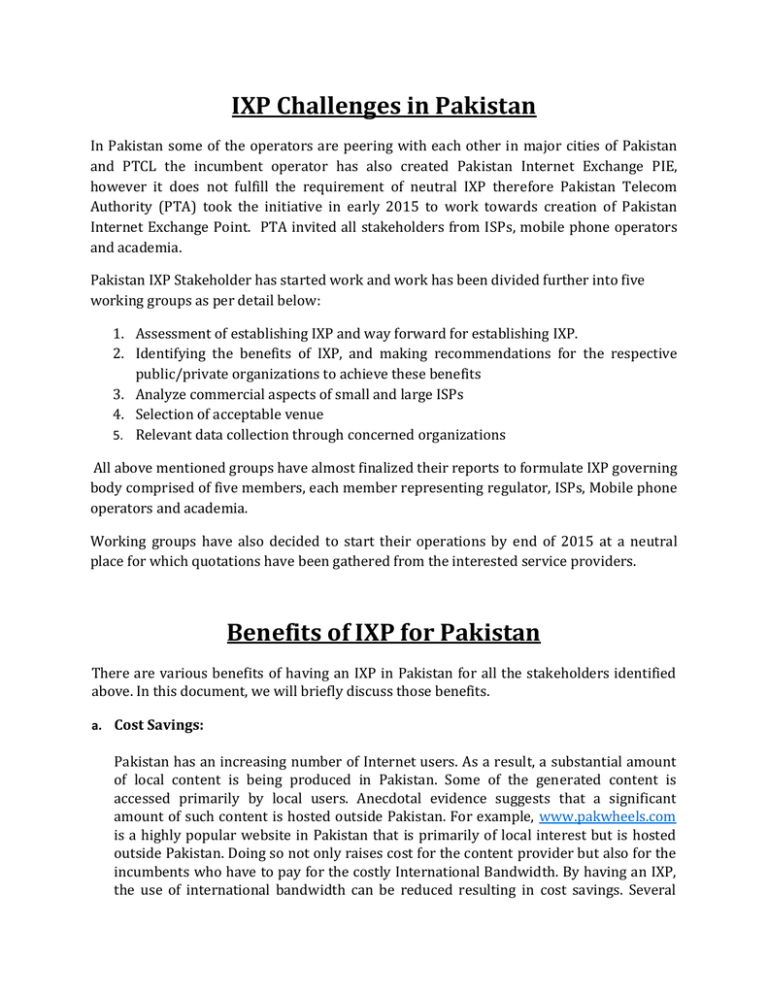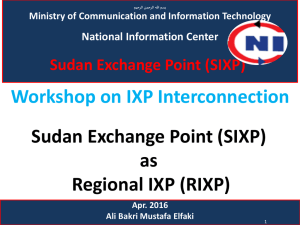IXP Challenges in Pakistan
advertisement

IXP Challenges in Pakistan In Pakistan some of the operators are peering with each other in major cities of Pakistan and PTCL the incumbent operator has also created Pakistan Internet Exchange PIE, however it does not fulfill the requirement of neutral IXP therefore Pakistan Telecom Authority (PTA) took the initiative in early 2015 to work towards creation of Pakistan Internet Exchange Point. PTA invited all stakeholders from ISPs, mobile phone operators and academia. Pakistan IXP Stakeholder has started work and work has been divided further into five working groups as per detail below: 1. Assessment of establishing IXP and way forward for establishing IXP. 2. Identifying the benefits of IXP, and making recommendations for the respective public/private organizations to achieve these benefits 3. Analyze commercial aspects of small and large ISPs 4. Selection of acceptable venue 5. Relevant data collection through concerned organizations All above mentioned groups have almost finalized their reports to formulate IXP governing body comprised of five members, each member representing regulator, ISPs, Mobile phone operators and academia. Working groups have also decided to start their operations by end of 2015 at a neutral place for which quotations have been gathered from the interested service providers. Benefits of IXP for Pakistan There are various benefits of having an IXP in Pakistan for all the stakeholders identified above. In this document, we will briefly discuss those benefits. a. Cost Savings: Pakistan has an increasing number of Internet users. As a result, a substantial amount of local content is being produced in Pakistan. Some of the generated content is accessed primarily by local users. Anecdotal evidence suggests that a significant amount of such content is hosted outside Pakistan. For example, www.pakwheels.com is a highly popular website in Pakistan that is primarily of local interest but is hosted outside Pakistan. Doing so not only raises cost for the content provider but also for the incumbents who have to pay for the costly International Bandwidth. By having an IXP, the use of international bandwidth can be reduced resulting in cost savings. Several countries have observed these cost savings in the recent past. For example, Kenya and Egypt saved more than $1.5 million per year on International transit costs by having an IXP. b. Lower Latency and Better User Experience: One of the key benefits of having an IXP is that it can lead to lower latency for the end users. This is because for content hosted locally, traffic does not need to go through an incumbent operator. This lower latency will improve user experience due to direct peering between ISPs. For example, the typical round‐trip latency from Lahore to New York ranges from 200ms‐300ms. If the local content (previously hosted in New York) is moved inside the country, this can reduce latency to less than 20ms. In addition it will also help in reducing load on incumbent networks. The incumbent can use this spare capacity to attract new customers and offer new services. c. Local Content Hosting and Content Generation: By having an IXP, ISPs can directly peer with each other to exchange traffic. This would incentivize local content hosting that will lower costs and save on foreign exchange. Moreover, reduced cost savings will encourage more local content development. d. Development of Local Cloud Infrastructures: Cloud computing is emerging as a major technology for users across the world. Users can rent computational, storage, and networking resources on the cloud through a pay as you model. This helps in hosting large‐scale web services by lowering capital costs. Such cost savings are essential for encouraging entrepreneurship in Pakistan (especially technology based startups) as new companies often have to host services for which initial capital investment can be too high to be viable. Unfortunately, all major cloud providers are hosted outside Pakistan. Having an IXP will facilitate developing of local cloud providers by reducing costs and improving performance. e. Improved Security: By having an IXP, a significant amount of traffic will remain local and would not have to traverse International networks. This will help lower security breaches and also help address any privacy concerns related to the local traffic in Pakistan. f. Availability of Services in case of Disruption in International bandwidth: Local content hosting facilitated by having an IXP will help prevent several global Internet outages that lead to reduction in International bandwidth (or temporary cutoff) from affecting local traffic. Even though disruption in International bandwidth is relatively rare but it does happen (e.g., due to cuts in undersea cables), which can in turn significantly impact local technology based companies by lowering their revenues. g. Attraction for International companies like Google and dailymotion to create Local Images of their Servers, in Pakistan: An IXP will also encourage local hosting of global services that require high bandwidth (e.g., Facebook) usage. International companies can deploy their content distribution networks (CDNs) at the IXP location to provide improved user experience. This would also substantially reduce International bandwidth usage leading to reduced costs. Challenges 1. Lack of Trust: Generally small ISPs are willing to join IXP, however most of them have lack of trust with incumbent operator, as small ISPs feel that they may lose business and eventually they will be dependent on incumbent operator. To build confidence amongst all ISPs, Pakistan Telecom Authority (PTA) has ensured that neutral multi stakeholder governing body, comprised of Government, ISPs, mobile phone operators and academia will monitor the activities to safeguard the rights of all stakeholders. 2. Selection of Neutral Venue: Selection of neutral venue for the IXP operations is also a big challenge for the working group, as group has recommended that IXP venue should be in center of the city, accessible for all ISP’s technical teams, cost effective and secure. It is also a big question whether new infrastructure has to be built or IXP should be hosted in the existing infrastructure of some ISP or other neutral organization should be hired. 3. Infrastructure development cost: One of main issue is initial and recurring costs. Since deployment of new infrastructure involves lot of investment therefore cost of initial deployment and operational cost needs to be finalize before start of the IXP operations. In case of hiring of building new infrastructure capital expenditure (or initial cost) will go up, whereas in case of hiring an infrastructure, operation expenditure will go up. In both cases, it has to ensure, how the costs shall be met, especially in long run. 4. Technical expertise: Although most of the ISPs are already peering with each other, however there is need to understand the lack of technical capabilities of most of the ISP staff. To enhance technical expertise od IXP in Pakistan, Pakistan’s IXP stakeholders group is coordinating with different international organizations like APNIC, ISOC and ICANN to arrange training programs for capacity building of Pakistani community. 5. Hosting of popular sites outside country: Currently, most of the popular Pakistani websites like www.zameen.com, www.pakwheels.com, www.urdupoint.com, www.express.pk and www.jang.com.pk are hosted outside Pakistan, therefore there is need to shift / mirror their hosting at local ISP for getting true benefits of IXP for Pakistan. In addition to above, there is also need to convince popular international websites like www.facebook.com, www.google.com.pk, www.yahoo.com, www.dailymotion.com, www.bbc.co.uk and www.cnn.com to place a mirror of the site at any of the Pakistani ISP, to get better user experience, after start of IXP. 6. Lack of local content: It has been felt that currently, most of the content is in English which is difficult to understand by vast segment of the society, therefore there is dime requirement of promoting local content in national language Urdu and provincial languages like Sindhi, Pashto, Punjabi and Balochi, for broader knowledgebase and impact of the Internet and IXP.



